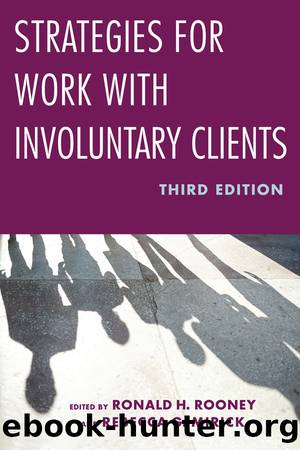Strategies for Work with Involuntary Clients by Ronald Rooney Rebecca G. Mirick

Author:Ronald Rooney, Rebecca G. Mirick [Ronald Rooney, Rebecca G. Mirick]
Language: eng
Format: epub
ISBN: 9780231133197
Barnesnoble:
Publisher: Columbia University Press
Published: 2009-01-28T00:00:00+00:00
Emergence of Family-Centered Interventions for Involuntary Families
Service delivery interventions designed to address families in a broader systems perspective have emerged that address many of the concerns raised earlier about involuntary work with families. Across many types of work with families, a strengths-based approach is often incorporated into the policy and into the work with families.
A strengths-based approach (Saleeby 1992, 2004) is based in the assumption that all families have strengths, resources, and skills. The practitioner collaboratively works with the client or family to help them discover and apply these strengths to resolve the presenting problem. Client empowerment and self-determination are key characteristics of this approach. Cowger (1994) identifies the importance of empowering all clients through the strengths perspective. Client empowerment is particularly important for involuntary clients because they enter the working relationship in a position of relatively less power than voluntary clients. A solutions-focused approach (de Shazer 1991) is one type of strengths-based approach that has been successfully used to work with both voluntary and involuntary families (Berg and Kelly 2000; Lloyd and Dallos 2008; Thompson et al. 2009). A solutions-focused approach supports clients in accessing internal and external resources to effectively address current problems. The approach includes well-known techniques such as scaling questions and the miracle question. The miracle question is a way to access clientsâ conceptualization of a future without the problem. A practitioner asks the client a variation of this question: âSuppose, after you went to sleep tonight, a miracle happened and your problem disappeared. When you woke up in the morning, what would be different? How would you know that the problem was gone?â It can be combined with other approaches, such as a family therapy approach, as long as the practitioner adheres to the basic assumptions of the approach (Trepper et al. 2006). However, there are some limitations to the strengths perspective when it is applied to involuntary families. Sometimes techniques and strategies that are effective and empowering when used with voluntary clients do not work well with involuntary clients. For example, Rosenberg (2000) describes how the miracle question can emphasize the powerlessness of mandated clients, who often feel unable to change the problem which is defined by the referring agency or court. Many involuntary families are struggling with larger contextual issues, such as poverty, lack of resources, discrimination, and oppression. Berg and Kelly (2000) suggest that the ideals of the strengths perspective, that people have the internal resources to make necessary changes with support from the practitioner, may not address the significant lack of necessary resources experienced by many of these families.
Download
This site does not store any files on its server. We only index and link to content provided by other sites. Please contact the content providers to delete copyright contents if any and email us, we'll remove relevant links or contents immediately.
Cecilia; Or, Memoirs of an Heiress — Volume 1 by Fanny Burney(32527)
Cecilia; Or, Memoirs of an Heiress — Volume 2 by Fanny Burney(31928)
Cecilia; Or, Memoirs of an Heiress — Volume 3 by Fanny Burney(31915)
The Great Music City by Andrea Baker(31898)
We're Going to Need More Wine by Gabrielle Union(19020)
All the Missing Girls by Megan Miranda(15888)
Pimp by Iceberg Slim(14464)
Bombshells: Glamour Girls of a Lifetime by Sullivan Steve(14037)
For the Love of Europe by Rick Steves(13810)
Talking to Strangers by Malcolm Gladwell(13330)
Norse Mythology by Gaiman Neil(13314)
Fifty Shades Freed by E L James(13215)
Mindhunter: Inside the FBI's Elite Serial Crime Unit by John E. Douglas & Mark Olshaker(9289)
Crazy Rich Asians by Kevin Kwan(9261)
The Lost Art of Listening by Michael P. Nichols(7475)
Enlightenment Now: The Case for Reason, Science, Humanism, and Progress by Steven Pinker(7287)
The Four Agreements by Don Miguel Ruiz(6728)
Bad Blood by John Carreyrou(6599)
Weapons of Math Destruction by Cathy O'Neil(6248)
